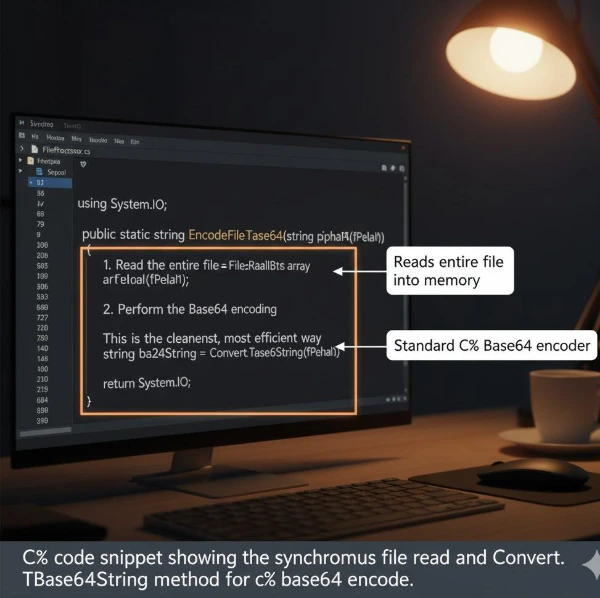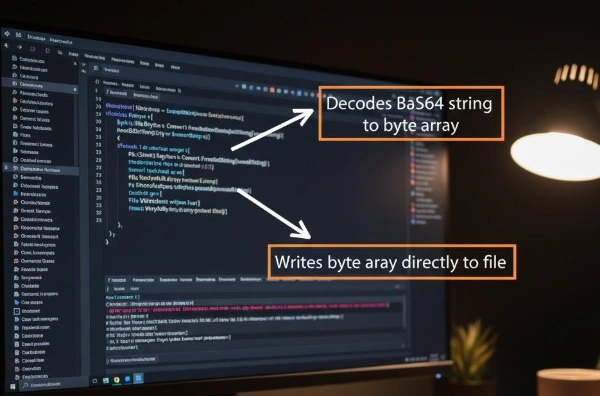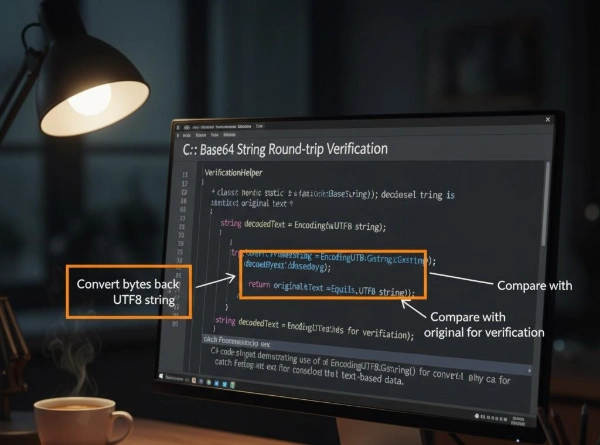Mastering File IO: The Definitive C# Base64 Encode and Decode Guide
In modern .NET development, binary data—especially files like images or PDFs—is often transmitted as a massive string. This requires two critical skills: first, converting the raw file bytes into that string (c# base64 encode), and second, safely reversing the process (c# base64 decode) without corruption. If you're still relying on inefficient old methods, you are exposing your application to unnecessary memory spikes and slow performance.
This guide leverages the power of System.Convert and modern
File.ReadAllBytes for the most robust file I/O and Base64 workflow in C#.
Phase 1: The Fastest C# Base64 Encode for Files
The most straightforward way to perform a c# base64 encode on a file is to read the file entirely into a byte array and then use the built-in Convert class. This approach is synchronous and best for smaller to medium-sized files (under 50MB).
using System.IO;
using System;
public static string EncodeFileToBase64(string filePath)
{
// 1. Read the entire file into a byte array
byte[] fileBytes = File.ReadAllBytes(filePath);
// 2. Perform the Base64 encoding
// This is the cleanest, most efficient way to achieve c# base64 encode
string base64String = Convert.ToBase64String(fileBytes);
return base64String;
}
This method ensures the byte array is correctly padded and formatted according to the Base64 standard, making it reliable for transmission across APIs or embedding in JSON payloads.

Phase 2: Robust C# Base64 Decode and Write to File
Reversing the process requires handling potential errors gracefully. When you perform c# base64 decode on an external string, you must anticipate invalid characters. We use `Convert.FromBase64String` and then use modern File I/O to write the resulting bytes directly to the disk.
public static void DecodeBase64ToFile(string base64String, string outputPath)
{
try
{
// 1. Decode the Base64 string into a byte array
// This is the core of csharp base64 decoding
byte[] fileBytes = Convert.FromBase64String(base64String);
// 2. Write the byte array directly to the output path
File.WriteAllBytes(outputPath, fileBytes);
}
catch (FormatException ex)
{
// Catches errors due to illegal characters, padding errors, or whitespace
Console.WriteLine($"Decoding Failed: Check if the string is valid Base64. {ex.Message}");
}
}
The exception handling for FormatException is crucial here. If your input string
contains anything other than valid Base64 characters, the application will crash without this safety net.

Performance Alert: The Hidden Cost of Large File Encoding
While File.ReadAllBytes is fast, it loads the entire file into memory *before*
encoding. For large files (over 100MB), this can lead to unacceptable memory spikes and out-of-memory
exceptions on constrained servers. There is a better, streaming way.
Expert Insight: Asynchronous C# Base64 Decoding Best Practices
In modern C# applications (like ASP.NET Core services), blocking I/O is a death sentence for concurrency. You should never use the synchronous File.ReadAllBytes in a web request thread.

Conclusion: Reliable Base64 is Simple C#
The standard C# .NET libraries provide everything needed for efficient c# base64
encode and csharp base64 decoding. By using
Convert.ToBase64String and including proper FormatException handling on decode, you ensure your
file I/O pipeline is both fast and robust.
Stop Debugging Cryptic C# FormatExceptions!
Use our free, instant Base64 Validator and Cleaner Tool to ensure your input strings are perfect before encoding or decoding.
Validate Your String Now →